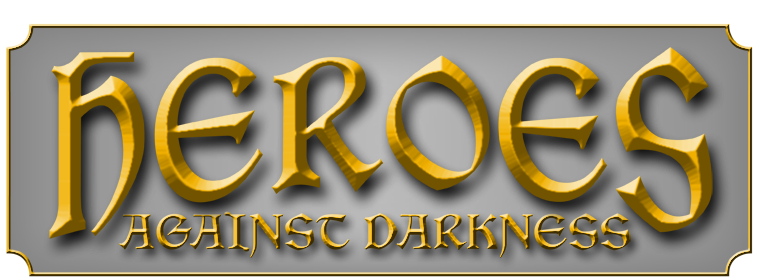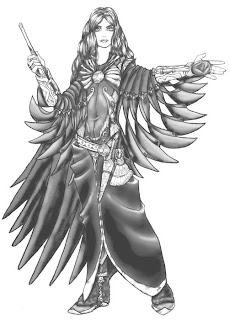Of all of the decisions I've made during the development of Heroes Against Darkness, the page limitation on spells per class is - at first glance - amongst the most arbitrary. However, my hope is that this limitation actually reinforces the game's goal of balancing the magi and martial classes.
Over the course of the 10 levels of full support in Heroes Against Darkness, the martial classes have about 17 powers. These 17 powers include a few common ones, like Rally, Melee Attack, and Ranged Attack, and then unique powers for each class which two are gained each level up to Level 5, and then one per level until Level 10. All in all, each martial class's 17 powers takes up two pages. By way of contrast, each of the magi classes has spells from the Common Spells list (which is itself three pages) and from the class's unique list which I deliberately limited to four pages. The spells generally take up a little more space on the page than the martial powers, so the four unique pages of spells for each magi class gives them about 35 spells, which is twice as many spell powers as the martial characters have martial powers.
I previously wrote about the number of pages that some other fantasy RPGs have dedicated to their spell lists:
RPG Round-Up: How Many Pages of Spells!?
Here's the breakdown, for your convenience:
Maybe it's unfounded, but my feeling is that games that dedicate a disproportionately large number of their pages to spell lists are more likely to focus more on magi classes at the expense of other classes. More pages of spells gives magi more options and tempts the games' designers to create more and more specialist spells, which are themselves likely to stomp on the specialties of other classes. So each extra page of spells for the magi increases the scope of that class and when that is not matched by a corresponding increase in the capabilities of the martial classes, then the relative power and utility of that magi class increases.
Obviously, magi do offer a level of complexity in play then martial characters, and the magic system in Heroes Against Darkness still offers that complexity (and more through the flexible anima system). Hopefully the game finds a balance between the complexity of the magi classes with the utility of the martial classes.
Check out Heroes Against Darkness over at the downloads page: Heroes Against Darkness - Game Rules.
Over the course of the 10 levels of full support in Heroes Against Darkness, the martial classes have about 17 powers. These 17 powers include a few common ones, like Rally, Melee Attack, and Ranged Attack, and then unique powers for each class which two are gained each level up to Level 5, and then one per level until Level 10. All in all, each martial class's 17 powers takes up two pages. By way of contrast, each of the magi classes has spells from the Common Spells list (which is itself three pages) and from the class's unique list which I deliberately limited to four pages. The spells generally take up a little more space on the page than the martial powers, so the four unique pages of spells for each magi class gives them about 35 spells, which is twice as many spell powers as the martial characters have martial powers.
I previously wrote about the number of pages that some other fantasy RPGs have dedicated to their spell lists:
RPG Round-Up: How Many Pages of Spells!?
Here's the breakdown, for your convenience:
D&D Systems
| System | Pages of Spells | Player's Guide Pages | Percentage | Notes |
|---|---|---|---|---|
| Basic D&D | 4 | 64 | 6% | Combined Player's and DM's Guide |
| Expert D&D | 8 | 64 | 13% | Combined Player's and DM's Guide |
| AD&D | 60 | 128 | 47% | |
| AD&D 2nd Edition | 118 | 256 | 46% | |
| D&D 3rd Edition | 115 | 286 | 40% | |
| D&D 4th Edition | 39 | 316 | 12% | Cleric, Paladin, Warlock, Wizard |
Non-D&D Systems
| System | Pages of Spells | Player's Guide Pages | Percentage | Notes |
|---|---|---|---|---|
| Castles & Crusades | 53 | 128 | 41% | |
| Dragon Warriors | 35 | 106 | 33% | |
| Dragon Age | 4 | 64 | 6% | Level 1-5 only |
| Dungeon Crawl Classic | 44 | 147 | 30% | |
| Heroes Against Darkness | 23 | 102 | 23% | |
| Pathfinder | 150 | 396 | 38% | |
| Savage Worlds (Explorer's Edition) | 10 | 159 | 6% | |
| Savage Worlds: Fantasy Companion | 21 | 158 | 13% | Includes spells in the Explorer's Edition |
| Savage Worlds (Deluxe Edition) | 11 | 159 | 7% | |
| Swords & Wizardry | 24 | 70 | 34% | |
| Warhammer Fantasy Role-Playing (2nd Edition) | 23 | 189 | 12% |
Maybe it's unfounded, but my feeling is that games that dedicate a disproportionately large number of their pages to spell lists are more likely to focus more on magi classes at the expense of other classes. More pages of spells gives magi more options and tempts the games' designers to create more and more specialist spells, which are themselves likely to stomp on the specialties of other classes. So each extra page of spells for the magi increases the scope of that class and when that is not matched by a corresponding increase in the capabilities of the martial classes, then the relative power and utility of that magi class increases.
Obviously, magi do offer a level of complexity in play then martial characters, and the magic system in Heroes Against Darkness still offers that complexity (and more through the flexible anima system). Hopefully the game finds a balance between the complexity of the magi classes with the utility of the martial classes.
Check out Heroes Against Darkness over at the downloads page: Heroes Against Darkness - Game Rules.







